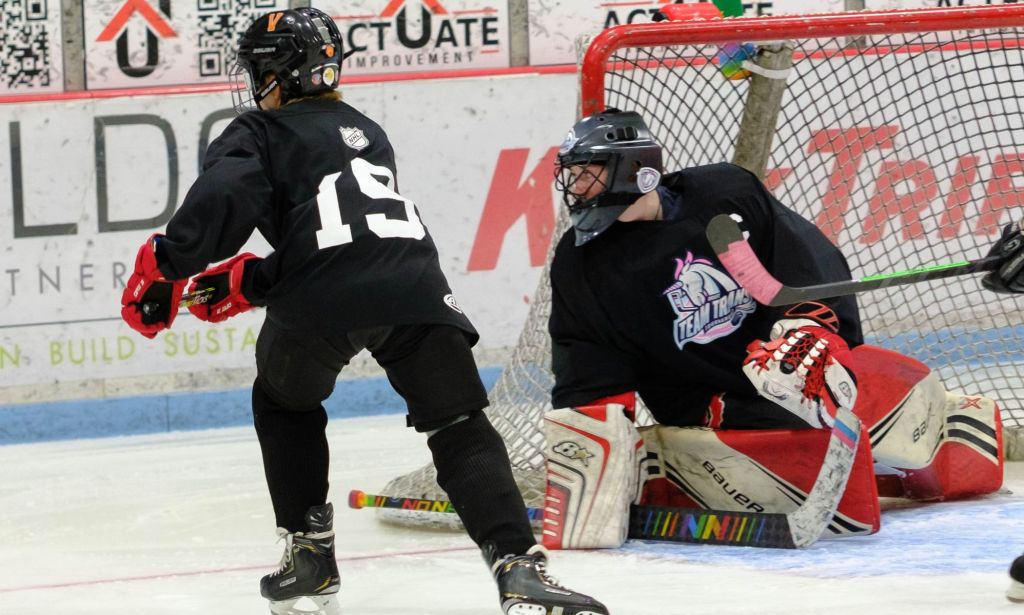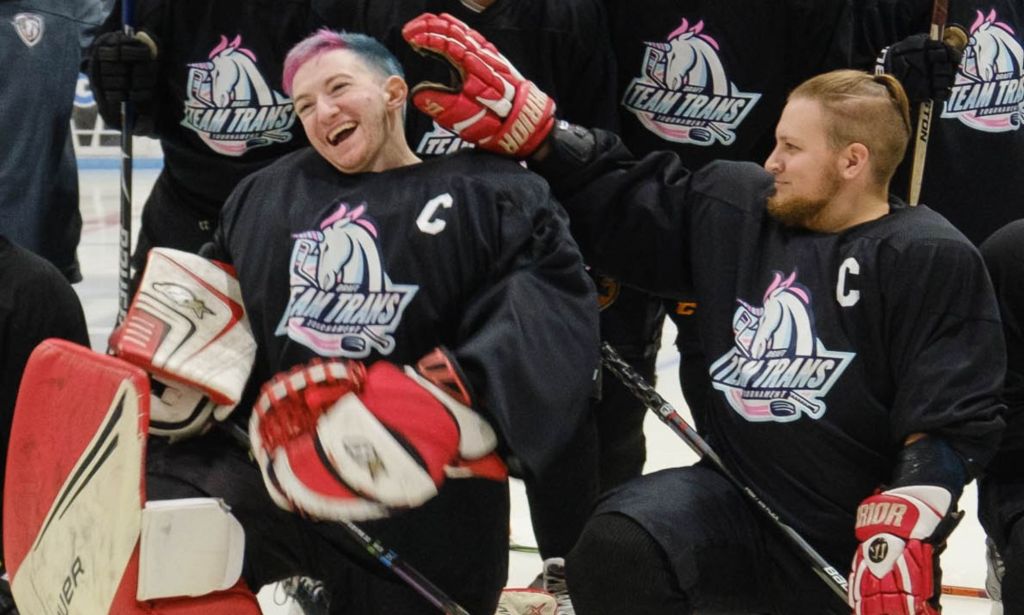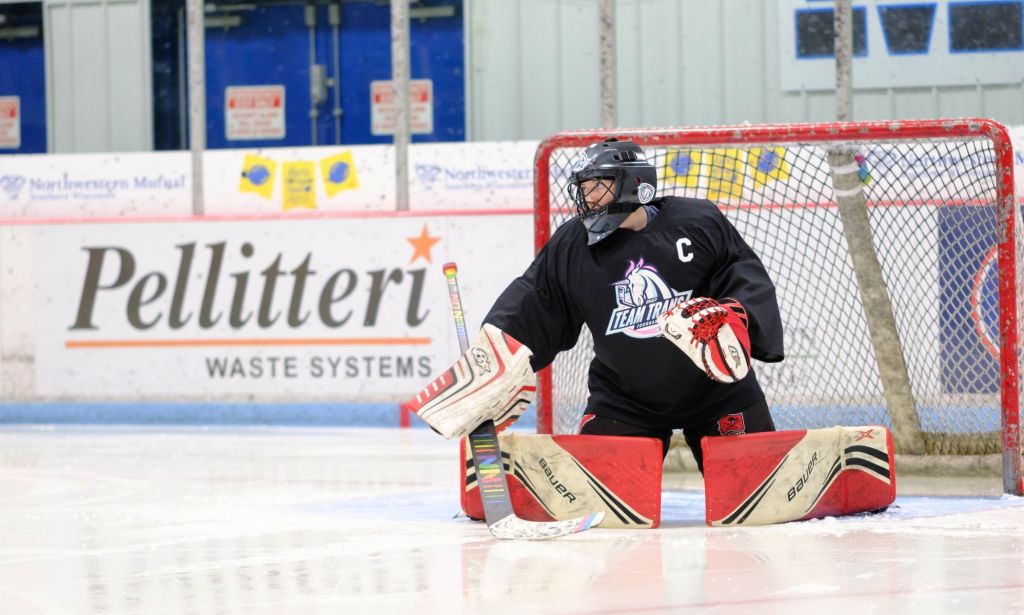The National Hockey League finds itself on thin ice with some conservatives as a new target in the U.S. culture war.
In the run-up to its All-Star Game in Florida on Saturday, the league has sought to put its efforts aimed at promoting diversity and inclusion front and center. But those moves have drawn sharp criticism from powerful conservatives, including Florida Gov. Ron DeSantis, a leading contender for the 2024 GOP presidential nomination, and Fox News host Tucker Carlson, the most-watched primetime cable news host, and sparked controversy on and off the ice.
There’s little indication those tensions will soon wane. Amid calls for change from both inside and outside the sport, the NHL and its teams have sought to address past instances of racism and abuse, diversify its workforce and foster a welcoming environment for LGBTQ fans and athletes. In doing so, the league has promoted semi-regular “Pride” nights at games, conducted a top-to-bottom diversity and inclusion assessment of itself and appealed to racial and ethnic groups who have traditionally not made up a significant portion of the league’s workforce.
At the same time, leading conservatives argue that some of those initiatives are openly discriminatory toward straight white men — who still make up the vast majority of team and league employees — or impede on religious freedom. DeSantis, ahead of his potential presidential bid, has strategically picked fights on social issues with large corporations and entities like Disney, the College Board and the NHL when they are operating in his state, which he has said is where “woke goes to die.”
Shaun Anderson, an assistant professor at Loyola Marymount University who focuses on the intersection of sports and social justice initiatives, said the idea that the NHL’s recent efforts at changing hockey culture are too “woke” is comical. For years, it lagged behind contemporary leagues like the NFL and NBA when it came to addressing social, cultural and political issues.
“I kind of laugh, because the [idea of the] woke NHL,” he said, “I’m like, ‘well, they must’ve woken up yesterday.”
It’s in Florida where one of the more prominent face-offs took place. Weeks ago, the league published a post on LinkedIn advertising its “Pathway to Hockey Summit,” an informational career event the NHL ultimately hosted Thursday at the start of its All-Star weekend festivities. The forum was described as being for “those that have historically not been exposed to hockey” to learn more about opportunities within the game.
It included a note that read: “Participants must be 18 years of age or older, based in the U.S., and identify as female, Black, Asian/Pacific Islander, Hispanic/Latino, Indigenous, LGBTQIA+, and/or a person with a disability. Veterans are also welcome and encouraged to attend.”
The league subsequently said the phrasing was a mistake and replaced the post, but not before DeSantis’ office condemned it in a statement and called for the “discriminatory prohibitions” on attendance be removed.
“Discrimination of any sort is not welcome in the state of Florida, and we do not abide by the woke notion that discrimination should be overlooked if applied in a politically popular manner or against a politically unpopular demographic,” spokesman Bryan Griffin said in a statement.
After the change, NHL Commissioner Gary Bettman told The Athletiche did not “want to get way into all of this” and “increase the debate on it” but said the event had been “mischaracterized.” DeSantis himself highlighted the episode, telling Fox News: “We’re not going to indulge in this woke conceit that it’s OK to discriminate against some people if that’s politically correct to do so and so we made it very clear to the NHL that they were running afoul of our laws.
“They reversed course very quickly,” he said. “And our society’s better when we’re all treated equally and all treated as individuals and not as members of groups.”
Florida state Rep. Randy Fine, a Republican, described the NHL’s description of the initiative as openly racist and said the league folded on the issue because they did not have “a publicly palatable position.”
“People engage in sports to get away from politics,” he said. “The notion of using these vehicles to jam this down people’s throats, I think it’s short-sighted, I think it’s a terrible business strategy.”
He added, however, that he did not find anything wrong with a private business wanting to diversify its workforce, but he objected to the framing of this event.
“Had the thing said, ‘Hey, we’re having a diversity event, and we’d love folks from these groups to come, but everybody’s welcome, I don’t think it would have gotten on the governor’s radar screen,” he said. “But the event literally said white men are forbidden from attending. That should bother people.”
Florida state Sen. Shevrin Jones, a Democrat, countered that the league “backtracking” from the post in light of DeSantis’ pushback was “dangerous” and, when considered with DeSantis’ broad actions on social issues, “should be a national concern for everyone.”
“Hockey is just not a sport that’s popular within the Black community,” Jones said. “The fact that the NHL saw it to be necessary to reach across to lend a hand to bring Blacks and others to appreciate the sport, that is the stance of right. That is being inclusive. That is making sure that everybody can enjoy hockey. … This will cause long-term effects if companies start bowing down to this authoritarian, fascist way of leadership that we’re seeing.”
Though the league changed its promotion of the event, the summit did take place as originally scheduled on Thursday and, as the Associated Press reported, was focused on diversity efforts. Kim Davis, the NHL’s executive vice president of social impact, growth and legislative affairs, told the outlet the league does not “mind the hard questions being asked, as long as the assessment is fair.”
In October, the league released the results of an internal diversity and inclusion assessment, which found that roughly 84% of league employees were white while 93% identified as straight. Davis said the league plans to update the survey every two years.
The NHL did not respond to a request to speak with Davis for comment for this story.
Former NHL forward Brandon Bochenski, now the Republican mayor of Grand Forks, North Dakota, thought it was inevitable that the same forces for social change that have pushed for progress in other sports would soon shape hockey.
“The NHL was the next target, I suppose,” he said. “It’s tough, because diversity is more than skin color and sexuality. I think a lot of people believe that.”
One reason the NHL has traditionally attracted a majority white audience and talent pool is that the game is most popular in countries with lengthy and sustained winters — such as Canada, Russia and Scandinavian countries — that are less racially diverse.
And in the United States, the sport’s high costs for skates, pads, sticks and other equipment and fees have also often made it a more exclusive sport, limited to affluent communities — an issue Bochenski said the league should be at the forefront of solving.
But Bochenski said the backgrounds of people in the sport are more varied than they first appear.
“I don’t think that hockey on the cover maybe looks as diverse as it really is,” he said. “If you get in there and you talk to guys, whether they come from different faiths, different families, different upbringings, how they treat people, there’s a lot more to it. So I think it frustrates people when it’s really just focused on only skin color and sexuality because you do have a pretty diverse group of people that are making up the NHL.”
The league has skated into thorny issues beyond the DeSantis dust-up in recent weeks. Ahead of a “Pride Night” game between the Philadelphia Flyers and Anaheim Ducks last month, Flyers defenseman Ivan Provorov opted against participating in the pre-game skate because he refused to wear the pride-themed warm-up jersey, saying after the contest he wanted “to stay true to myself and my religion.” The incident sparked both backlash against, and support for, the Russian-born player.
Last week, the New York Rangers, aware of how the Provorov situation played out, chose not to wear their scheduled pride-themed warm-ups, with the team saying in a statement the “organization respects the LGBTQ+ community and we are proud to bring attention to important local community organizations as part of another great Pride Night.
“In keeping with our organization’s core values, we support everyone’s individual right to respectfully express their beliefs,” the team added.
Bochenski said both incidents would have created dilemmas within NHL locker rooms, where culture dictates that individuality is set aside for the whole of the team. For the Flyers, “having one [player who] wasn’t going to participate was probably tough for them to decide what to do.
“I think the Rangers decided not to put that pressure on anybody,” he said. “And I don’t know which one’s the right choice.”
In light of each instance, Anderson said the league and individual teams should strive “to always engage in a collaborative effort with the organization that’s putting out the initiative, and the people who are directly affected by it.
“The hope is that you do the right thing. You put these events together, and withstand a backlash,” he said. “Because you’re a multibillion dollar company. Everybody that says, Oh, I’m going to stop watching the NFL or the NHL because it’s ‘woke,’ that’s going to subside.”
“And then,” he continued, “you’re doing right by a group of people who only want a chance at doing something great in sports.”



